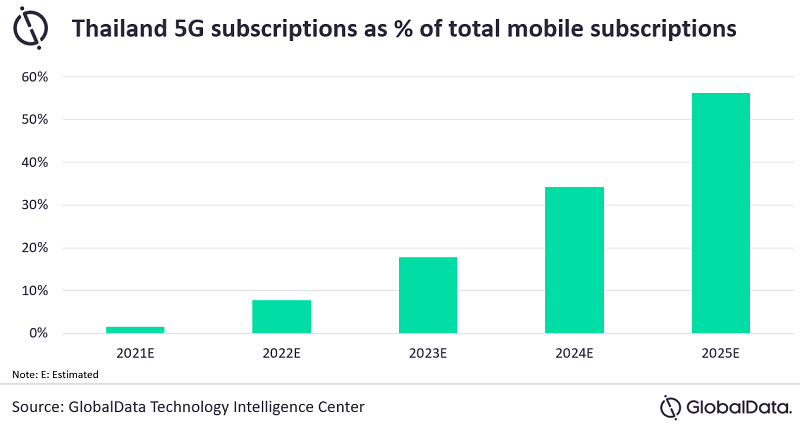5G mobile subscriptions are expected to drive the mobile communications market in Thailand by 2025, fuelled by growing demand for high-speed data transmission and low latency network. The demand for digital solutions in sectors such as healthcare, education, retail and tourism will drive the development of 5G in Thailand augmented by new normal after COVID-19, according to GlobalData, a leading data and analytics company.
An analysis of GlobalData’s Thailand Mobile Broadband Forecast Pack reveals that 5G subscriptions as percentage (%) of the total mobile subscriptions in the country are estimated to account for more than 55% in 2025.

Sree Venkatesh, Senior Analyst of Telecoms Market Data & Intelligence at GlobalData, says: “Mobile operators are working to strengthen 5G network coverage and encouraging customers to adopt 5G services. They are targeting consumers with innovative 5G mobile plans and simultaneously trying to demonstrate 5G use cases for enterprises.”
In addition, Thailand is making significant progress to develop 5G technology. The Prime Minister of Thailand, Prayut Chan-o-cha, is the chairman of 26 members ‘National 5G Committee’, which aims to ensure necessary support from the government in 5G development. The committee also consists of ministers from the education, tourism, and finance departments.
AIS, the leading mobile communications service provider in Thailand, is offering virtual reality and cloud applications to encourage 5G adoption in the consumer segment. AIS commercial 5G mobile plans include mobile applications such as ‘AIS 5G Play AR’ for virtual reality content and ‘AIS Cloud Game’. In addition, AIS has signed a memorandum of understanding with Bangkadi Industrial Park in October 2020 to develop 5G solutions to modernize factories at the park.
Mr. Venkatesh concludes: “5G is expected to drive the mobile communications market during the forecast period 2020-2025 in Thailand. 5G adoption in Thailand will be driven by growing popularity for 5G mobile applications, the decline in 5G handset prices, need for enterprise digital transformation, and Thailand government’s smart city initiatives.”











